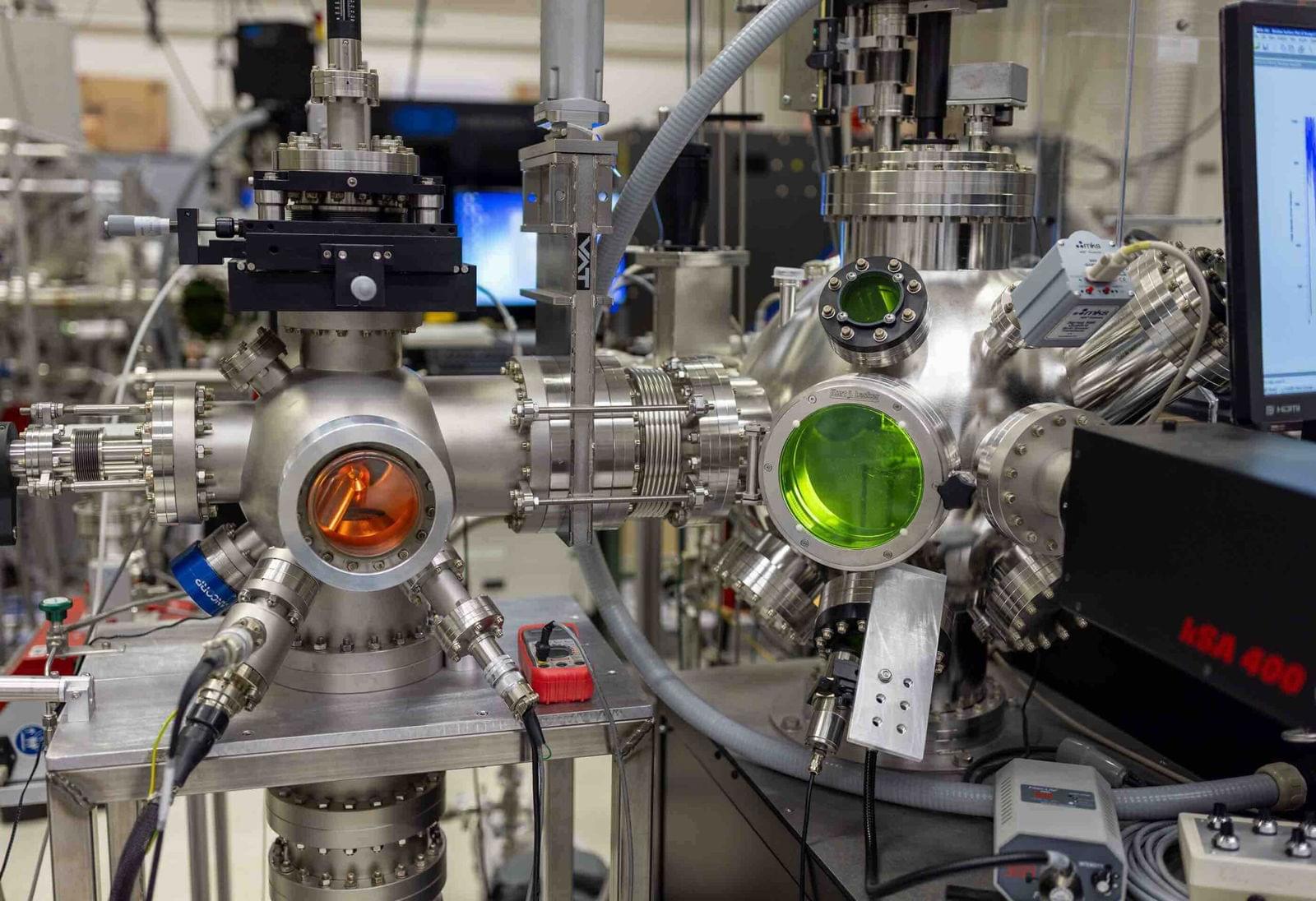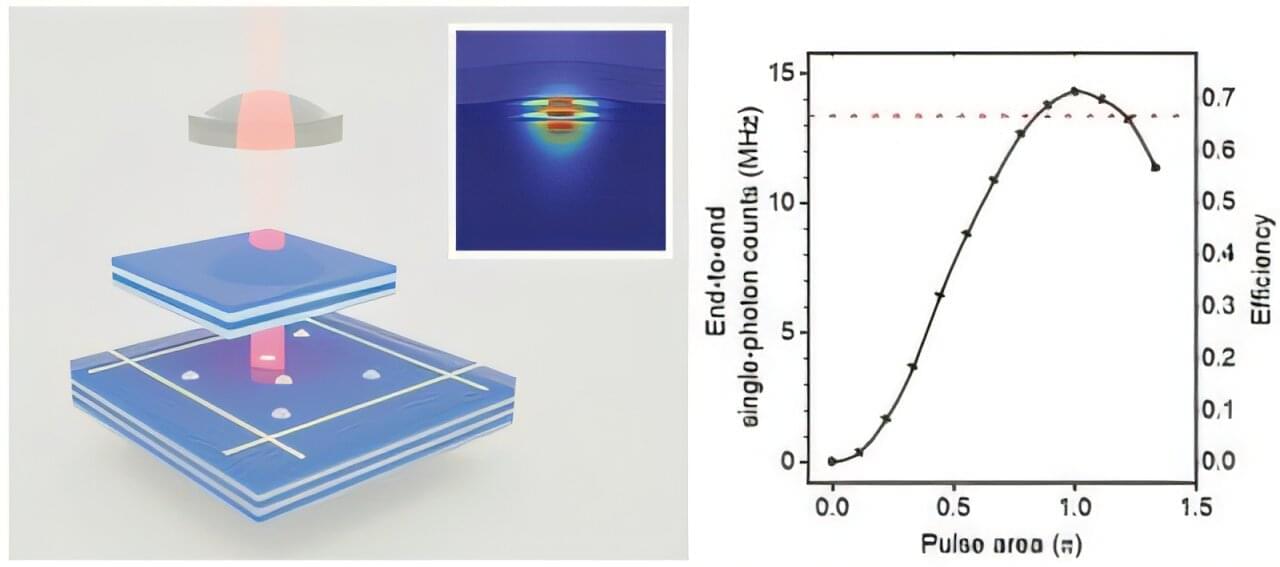Useful quantum networks are hobbled by the problem of decoherence from environmental “noise.” But a new breakthrough could change that.



Quantum computers promise to outperform today’s traditional computers in many areas of science, including chemistry, physics, and cryptography, but proving they will be superior has been challenging. The most well-known problem in which quantum computers are expected to have the edge, a trait physicists call “quantum advantage,” involves factoring large numbers, a hard math problem that lies at the root of securing digital information.
In 1994, Caltech alumnus Peter Shor (BS ‘81), then at Bell Labs, developed a quantum algorithm that would easily factor a large number in just seconds, whereas this type of problem could take a classical computer millions of years. Ultimately, when quantum computers are ready and working—a goal that researchers say may still be a decade or more away—these machines will be able to quickly factor large numbers behind cryptography schemes.
But, besides Shor’s algorithm, researchers have had a hard time coming up with problems where quantum computers will have a proven advantage. Now, reporting in a recent Nature Physics study titled “Local minima in quantum systems,” a Caltech-led team of researchers has identified a common physics problem that these futuristic machines would excel at solving. The problem has to do with simulating how materials cool down to their lowest-energy states.

A single molecule provides a controllable connection between a normal metal and a superconductor.
Researchers have caused a material’s superconductivity to permeate into a nearby normal metal via a single molecule [1]. They showed that this effect could be controlled and say that this control could allow the creation of so-called Majorana quasiparticles, which many research teams are exploring as future quantum bits (qubits) for quantum computers.
The spread of superconductivity into a normal metal in contact with a superconductor has been studied for decades. These experiments are typically done with thin films of the materials. However, the microscopic mechanism underpinning the effect—a normal-to-super-current conversion known as Andreev reflection—can be hard to control, and control is essential for applications of the effect.

A research team has successfully fine-tuned the Rabi oscillation of polaritons, quantum composite particles, by leveraging changes in electrical properties induced by crystal structure transformation. Published in Advanced Science, this study demonstrates that the properties of quantum particles can be controlled without the need for complex external devices, which is expected to greatly enhance the feasibility of practical quantum technology. The team was led by Professor Chang-Hee Cho from the Department of Physics and Chemistry at DGIST.
Quantum technology enables much faster and more precise information processing than conventional electronic devices and is gaining attention as a key driver of future industries, including quantum computing, communications, and sensors. At the core of this technology lies the ability to accurately generate and control quantum states. In particular, recent research has been actively exploring light-based quantum devices, with polaritons at the center of this field.
Polaritons are composite quasiparticles formed through the hybridization of photons and excitons—bound states arising from the motion of electrons. These quasiparticles travel at the speed of light while retaining the ability to interact with other particles, much like electrons.



For the better part of a century, the quantum objects known as quasiparticles have been all dressed up with nowhere to go. But that may change, now that a Yale-led team of physicists has shown it is possible to exert a greater level of control over at least one type of quasiparticle.
The discovery upends decades of fundamental science and may have wide applications for quantum-related research in the years ahead.
A quasiparticle is an “emergent” quantum object—a central, core particle surrounded by other particles that, together, demonstrate properties not found in each individual component. Quasiparticles have become the central conceptual picture by which scientists try to understand interacting quantum systems, including those that may be used in computing, sensors, and other devices.

Research teams from USTC have realized a high-performance single-photon source with an efficiency beyond the scalable linear optical quantum computing loss tolerance threshold for the first time. Led by Prof. Pan Jianwei, Lu Chaoyang and Hu Yongheng, the study was published in Nature Photonics on February 28.
Photons, as important carriers for quantum information processing, have the advantages of fast speed and strong resistance to environmental interference. However, for scalable linear optical quantum computing to be feasible, apart from the challenges like photons being easily lost, the efficiency of a single-photon source must exceed the tricky threshold of 2/3. Previous studies had never broken through this threshold, a key obstacle restricting the development of optical quantum computing.
To overcome this challenge, the research teams have developed a tunable open optical microcavity, achieving precise coupling of quantum dots and microcavities in both resonance frequency and spatial positioning. The microcavity solved the detuning problem of traditional fixed microcavities.

IN A NUTSHELL 🌍 China’s dominance in gallium production is reshaping global semiconductor and battery industries. ⚠️ Japan has raised alarms about the strategic implications of China’s control over critical resources like gallium, germanium, and antimony. 🔗 The U.S. sanctions against China have intensified competition for strategic raw materials, leading to trade tensions. 🏭 The
Register for member exclusives like early access to new content with a free Closer To Truth account: https://closertotruth.com/
Panpsychism is the theory that consciousness is irreducible and exists fundamentally at the foundations of reality. Panpsychism forms include ‘micropsychism,’ where fundamental particles or fields are in some sense conscious, and ‘Cosmopsychism,’ where the entire universe is in some sense conscious. What are the arguments for and against Panpsychism like the ‘combination problem’?
Closer To Truth is now on BlueSky! Follow us for updates, new videos, musings, and more: https://bsky.app/profile/closertotrut… Kastrup is a Brazilian-born Dutch philosopher and computer scientist best known for his work in the field of consciousness studies, particularly his development of analytic idealism, a form of metaphysical idealism grounded in the analytic philosophical tradition. Make a tax-deductible donation of any amount to help us continue exploring the world’s deepest questions: https://closertotruth.com/donate/ Closer To Truth, hosted by Robert Lawrence Kuhn, presents the world’s greatest thinkers exploring humanity’s deepest questions. Discover fundamental issues of existence. Engage new and diverse ways of thinking. Appreciate intense debates. Share your own opinions. Seek your own answers.
Bernardo Kastrup is a Brazilian-born Dutch philosopher and computer scientist best known for his work in the field of consciousness studies, particularly his development of analytic idealism, a form of metaphysical idealism grounded in the analytic philosophical tradition.
Make a tax-deductible donation of any amount to help us continue exploring the world’s deepest questions: https://closertotruth.com/donate/
Closer To Truth, hosted by Robert Lawrence Kuhn, presents the world’s greatest thinkers exploring humanity’s deepest questions. Discover fundamental issues of existence. Engage new and diverse ways of thinking. Appreciate intense debates. Share your own opinions. Seek your own answers.